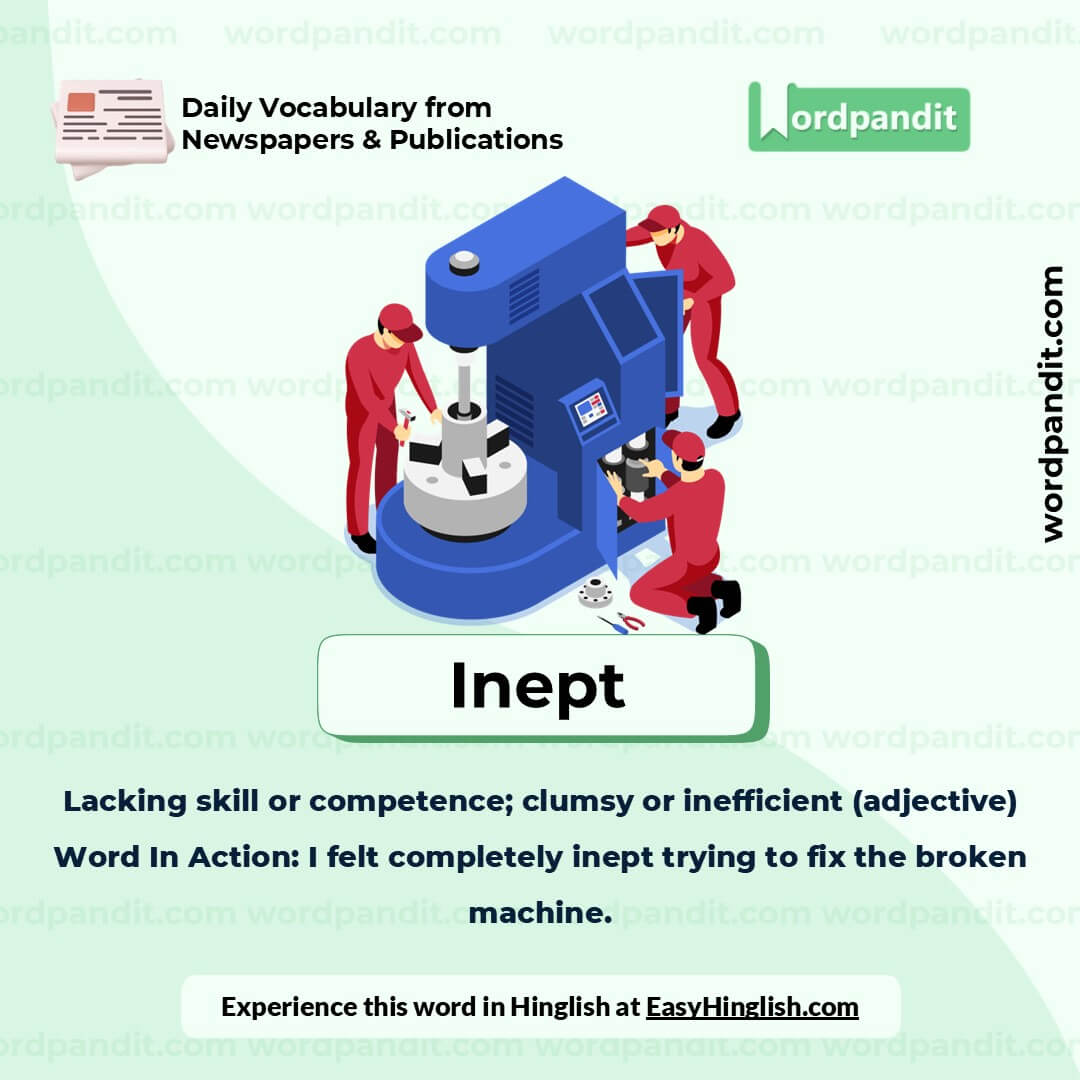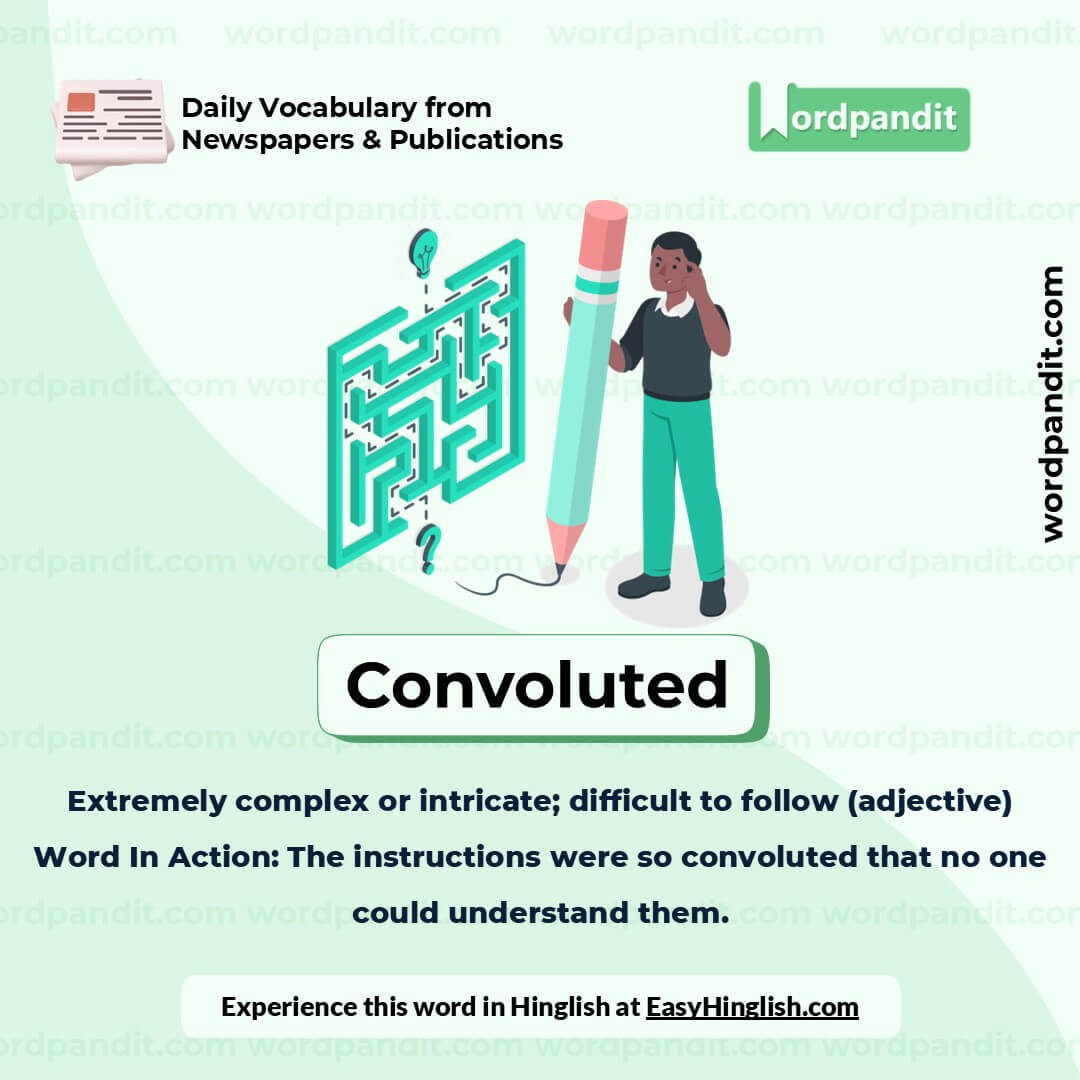Daily Vocabulary from International Newspapers and Publications
Expand Your Vocabulary with Wordpandit’s Global Vocabulary Hub
At Wordpandit, we are committed to helping you develop a truly global vocabulary by drawing from some of the most respected international publications. This section is designed to keep you ahead of the curve by introducing you to words that define global conversations and trends.
The Power of Global Sources
To help you think and communicate on a global scale, we curate vocabulary from renowned international sources, such as:
- The New York Times
- The Washington Post
- BBC
- The Guardian
- The Economist
- Scientific American
- Psychology Today
- And many more...
Stay Global, Stay Competitive
Our daily updates from international publications ensure you are consistently exposed to new words that reflect global news and developments, making sure your vocabulary is not only current but also globally relevant.
Enhance Your Global Perspective
Whether you’re preparing for international exams, aiming to excel in global business communication, or want to enhance your language skills for personal growth, Wordpandit offers the resources you need to thrive in a global context.
Effective Learning, Global Reach
Our learning methodology combines global examples, memory aids, and interactive activities, allowing you to internalize new words effectively and apply them in real-world scenarios.
Begin Your Global Vocabulary Journey Now!
Why Choose Wordpandit?
Practical Learning: Focus on words you'll actually encounter in real-world reading, enhancing your comprehension and communication skills.
Diverse Content: From current affairs to scientific breakthroughs, our varied sources expose you to vocabulary across multiple domains.
Effortless Integration: Make Wordpandit a part of your daily routine. Just a few minutes each day can significantly boost your lexicon over time.
Your Path to Vocabulary Mastery
- Visit our Daily Vocabulary section regularly
- Explore new words and their usage in context
- Practice incorporating these words into your own writing and speech
- Track your progress as your vocabulary expands
Start Your Journey Today
Embark on your vocabulary enhancement journey with Wordpandit. By consistently engaging with our daily posts, you'll build a robust vocabulary that serves you well in academic, professional, and personal contexts.
Remember, a word a day keeps linguistic limitations at bay. Make Wordpandit your daily companion in the quest for vocabulary excellence!
WORD-1: Inept
Context:
"Mexico’s staggering violence is in large part the result of its inept and corrupt system of justice." - The Washington Post
Explanatory Paragraph:
The word inept describes someone or something that lacks the necessary skills or ability to perform a task properly. It often implies a clumsiness or incompetence that can lead to negative consequences, as in the example sentence where an ineffective justice system contributes to ongoing issues.
Meaning: Lacking skill or competence; clumsy or inefficient (adjective)
Pronunciation: in-EHPT
Difficulty Level: ⭐⭐ (Intermediate)
Etymology: From Latin ineptus, meaning "unsuitable, inappropriate"
Synonyms & Antonyms:
Synonyms: incompetent, unskilled, unfit, clumsy, bungling
Antonyms: competent, skilled, adept, efficient, capable
Usage Examples:
- His inept handling of the situation only made things worse.
- The employee's ineptness in customer service led to numerous complaints.
- Despite her enthusiasm, her inept efforts in cooking resulted in a burned meal.
- The government’s inept response to the crisis caused public frustration.
Cultural Reference:
"In politics, an inept government can turn even the most stable of societies into chaos." - Common saying
Think About It:
Why do you think an organization or system might tolerate ineptitude among its members or leaders?
Quick Activity:
Think of a recent event where you saw someone acting ineptly. Write down what went wrong and how it could have been done better.
Memory Tip:
Remember "inept" by linking it to "inexpert" — both suggest a lack of skill or ability.
Real-World Application:
In professional settings, being labeled as "inept" can damage a person's reputation, which is why competence and continuous improvement are valued.
WORD-2: Unilateral
Context:
"Unilateral U.S. actions such as the capture of 'El Mayo' will do little to reduce the illicit drug trade." - The Washington Post
Explanatory Paragraph:
The term unilateral refers to actions or decisions made by one party or group without the involvement or agreement of others. In international relations or politics, a unilateral action often means a single country acting independently, potentially ignoring the input or cooperation of other nations, as in the example where the U.S. acted alone in capturing a drug cartel leader.
Meaning: Involving only one side or party (adjective)
Pronunciation: yoo-nuh-LAT-uh-ruhl
Difficulty Level: ⭐⭐⭐ (Intermediate)
Etymology: From Latin unus meaning "one" and latus meaning "side"
Synonyms & Antonyms:
Synonyms: one-sided, independent, autonomous, solo
Antonyms: multilateral, cooperative, collaborative, mutual
Usage Examples:
- The company’s unilateral decision to change its return policy upset many customers.
- Unilateral military action can strain relationships with allied nations.
- He made a unilateral choice to implement the policy without consulting his team.
- The government faced backlash for its unilateral approach to education reform.
Cultural Reference:
"In diplomacy, unilateral decisions often lead to greater conflicts instead of cooperation." - Common Political Commentary
Think About It:
Why might a country choose to act unilaterally on certain issues, even if it risks losing international support?
Quick Activity:
Think of a recent example where a company or country made a unilateral decision. Write down the impacts this decision had on others.
Memory Tip:
Remember "unilateral" by breaking it down to "uni-" meaning "one" and "lateral" meaning "side," indicating "one-sided" action.
Real-World Application:
The term "unilateral" is commonly used in politics and business to discuss decisions made by one party without collaboration, often sparking debate about the impacts of independent versus collaborative approaches.
WORD-3: Convoluted
Context:
"The court majority’s convoluted answer to the charge that they have unjustifiably placed the president above the law." - The Washington Post
Explanatory Paragraph:
The term convoluted describes something that is complicated, intricate, and difficult to understand. It often implies that an idea or explanation has been made overly complex, sometimes to the point of confusion, as seen in the example where the court's response is so complex that it becomes unclear.
Meaning: Extremely complex or intricate; difficult to follow (adjective)
Pronunciation: KON-vuh-loo-ted
Difficulty Level: ⭐⭐⭐ (Advanced)
Etymology: From Latin convolutus, past participle of convolvere, meaning "to roll together"
Synonyms & Antonyms:
Synonyms: complex, intricate, tangled, elaborate, labyrinthine
Antonyms: straightforward, simple, clear, uncomplicated, direct
Usage Examples:
- The novel’s plot was so convoluted that readers found it hard to keep up with the storyline.
- The instructions for assembling the furniture were convoluted, leading to widespread confusion.
- She gave a convoluted explanation that only seemed to complicate matters further.
- His convoluted reasoning made it difficult for others to understand his point.
Cultural Reference:
"Many conspiracy theories rely on convoluted explanations to seem believable." - Common Observation on Conspiracy Theories
Think About It:
Why do you think some people make explanations convoluted, rather than simplifying them?
Quick Activity:
Take a complex idea you’ve recently learned about and try to explain it in a simple, straightforward way. Notice any parts that feel convoluted.
Memory Tip:
Link "convoluted" to "convoluted maze" to remember its meaning of being tangled and difficult to navigate.
Real-World Application:
In legal and bureaucratic contexts, the word "convoluted" is often used to describe unclear or excessively complicated processes, where simplification would be helpful.
WORD-4: Evades
Context:
"The Trump majority evades the plain meaning of this text." - The Washington Post
Explanatory Paragraph:
The word evades refers to avoiding or escaping something, often in a skillful or deceptive way. It implies an attempt to sidestep an issue, question, or responsibility, as seen in the example where the court avoids acknowledging a clear interpretation of the text.
Meaning: To avoid or escape from, often by cleverness or trickery (verb)
Pronunciation: ih-VADEZ
Difficulty Level: ⭐⭐ (Intermediate)
Etymology: From Latin evadere, meaning "to escape" or "to go out"
Synonyms & Antonyms:
Synonyms: avoid, dodge, escape, elude, circumvent
Antonyms: confront, face, acknowledge, encounter, accept
Usage Examples:
- When asked about the issue, he evaded the question by changing the topic.
- The suspect managed to evade police for weeks before being caught.
- She evades responsibilities at work by shifting tasks to others.
- The politician evaded giving a direct answer during the debate.
Cultural Reference:
"The art of evasion is often seen in debates and negotiations, where avoiding direct answers can be a tactic." - Common Political Observation
Think About It:
Why might someone choose to evade a question or responsibility rather than face it directly?
Quick Activity:
Think of a time when you or someone else evaded a question. What was the reason behind avoiding a direct answer?
Memory Tip:
Remember "evades" by linking it to "escape," as both imply avoiding or getting away from something.
Real-World Application:
Understanding when people "evade" in conversations or negotiations can help you identify when they're avoiding accountability or responsibility.
WORD-5: Coffers
Context:
"The subsequent sanctions, which drained state coffers." - Al Jazeera
Explanatory Paragraph:
The word coffers refers to the funds or financial reserves of an organization, government, or institution. It is often used to discuss the state of finances, especially in terms of how full or depleted they are, as seen in the example where sanctions reduced the government’s available funds.
Meaning: The funds or financial resources of a government, organization, or individual (noun)
Pronunciation: KAW-fuhrz
Difficulty Level: ⭐⭐⭐ (Intermediate)
Etymology: From Old French cofre, meaning "chest or box," which originally referred to a literal storage chest for valuables
Synonyms & Antonyms:
Synonyms: treasury, funds, reserves, savings, capital
Antonyms: debts, liabilities, expenses
Usage Examples:
- The city council allocated funds from the municipal coffers to improve local infrastructure.
- The company’s coffers were significantly boosted by a successful product launch.
- War expenses rapidly drained the country’s coffers, leaving little for public services.
- After years of poor management, the organization’s coffers were nearly empty.
Cultural Reference:
"Throughout history, rulers have often taxed citizens to keep their coffers filled." - Historical Observation
Think About It:
Why do you think some governments or organizations struggle to keep their coffers full, while others maintain strong reserves?
Quick Activity:
Imagine a community fund that’s running low. List a few ways the community could replenish its coffers.
Memory Tip:
Think of "coffers" as "coffers of coins" to remember it relates to funds or financial reserves.
Real-World Application:
The concept of "coffers" is used in finance, government, and business to discuss the availability of funds, especially in contexts like budgeting, saving, and spending priorities.


















